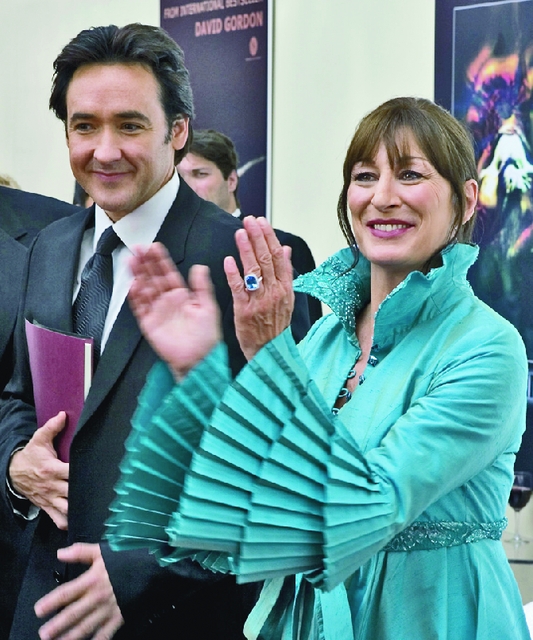According to the closing credits, the weepy, melodramatically indulgent dramedy Martian Child is “based on a true story.” Only “the characters and events have been fabricated.” So … what exactly is true here, the houses they used?Actually, that late admission is as credible a description as any I can concoct to describe this film: It’s real, earnest and phony as a million-dollar bill. The purpose is sincere, but the script is pure Hollywood fantasy–the end result of countless screenwriting seminars and audience surveys. It starts with the casting of John Cusack as David, a brokenhearted science fiction writer still recovering from his wife’s untimely death two years previous. In the real America, roughly 50 percent of all marriages end in divorce. In the Hollywood version of America, sensing the increased sympathy generated by the premature death of a spouse, most fictional marriages end in death. The movie and TV landscape is just littered with widows and widowers looking to heal their still-open emotional wounds in half-hour or 90-minute increments. (Steve Carell did it just last week with Dan in Real Life .)
One day, David is interrupted from crying at photos of his dead wife when he gets a call from an adoption agency. Some time ago, it seems, David and his poor dead wife thought about adopting a child. On a whim, David goes to the adoption agency. (Like every writer character ever dreamed up by Hollywood, he’s suffering from writer’s block and is grateful for the distraction.) There, he meets a troubled young boy just ripe for the adopting. Little Dennis (child actor
Bobby Coleman from TV’s short-lived
“Surface”) is what we call “Hollywood crazy.” He has severe trouble interacting with others, spends all his time in a cardboard box, wears a weight belt so he won’t float off into the atmosphere and firmly believes he was born on the planet Mars. In the real world, he’d be labeled autistic (at the very least). In Hollywood, he’s just a
very special boy .You see, in the mind of scriptwriters, people with mental and emotional handicaps are actually colorful, saintly do-gooders who know everything and are capable of healing any problem so-called “normal” people might be grappling with. (For reference, see most any Oscar-nominated drama since Rain Man .) Despite the fact that David is a single man who’s dealing with his own clinical depression, this film’s well-meaning adoption worker believes giving an “alien” kid to a sci-fi writer who’s happy to indulge the kid’s neurotic fantasies is a brilliant idea. Despite the fact that Dennis is struggling with some crippling issues of abandonment and has little to no grasp on reality, a string of scriptwriter-imagined psychiatrists say he “just needs some time.” Everybody here is firmly convinced that this questionable union will work out just hunky-dory for all involved.
And, of course, it will. Anyone looking for warm and fuzzy catharsis is sure to find it here. This is the sort of film so addicted to its own cheerful outlook on mental illness and childhood trauma it actually entertains the idea that,
gee whiz, maybe Dennis really is a magical, wondrous child from outer space (bringing to mind uncomfortable flashbacks of K-PAX and
Escape to Witch Mountain ).
Cusack emotes well enough. Young Mr. Coleman does a credible job with his patently incredible character. John’s wisecracking sister Joan contributes some much-appreciated humor as (what else?) David’s wisecracking sis. Everyone else comes in a distant second.
Oliver Platt overacts as David’s glad-handing agent.
Anjelica Huston gives us a full-on “
Glenn Close in
101 Dalmatians ” cameo as a ridiculous book publisher who delivers the film’s message with the subtlety of a cruise missile.
The biggest mistake
Martian Child makes is in trying to push its message past the obvious–that kids are a treasure and that families are great. Instead, it tries to lay down a broader moral about the need to be different. Our boy Dennis is a pale, antisocial, emotionally traumatized misfit who refuses to remove his sunglasses, talks in a whisper and believes he’s from another planet. (Basically, he’s exactly what you’d expect Michael Jackson’s kids to be like.) But who are we to say he isn’t from another planet? Who are we to change this special kid? Look at all the weird, misunderstood people this planet has produced: Mozart, Andy Warhol, Tiny Tim, John Waters, Tim Burton. Imagine if all those people were forced to be “normal.” Now, I’m the first person to champion the cause of nonconformity, but Martian Child does something very dangerous with its weirdness: It commodifies it. It takes the offbeat and makes it cute, mainstream, almost Muppet-like. It asks, in essence: “Wouldn’t it be great if all abused, abandoned, emotionally traumatized future serial killers were this adorable?” No, it wouldn’t. The weird are supposed to frighten straight people, challenge authority and defy convention. They’re not supposed to make mainstream audiences, ages 25-55, break out a hankie and wonder where to buy the soundtrack album.



